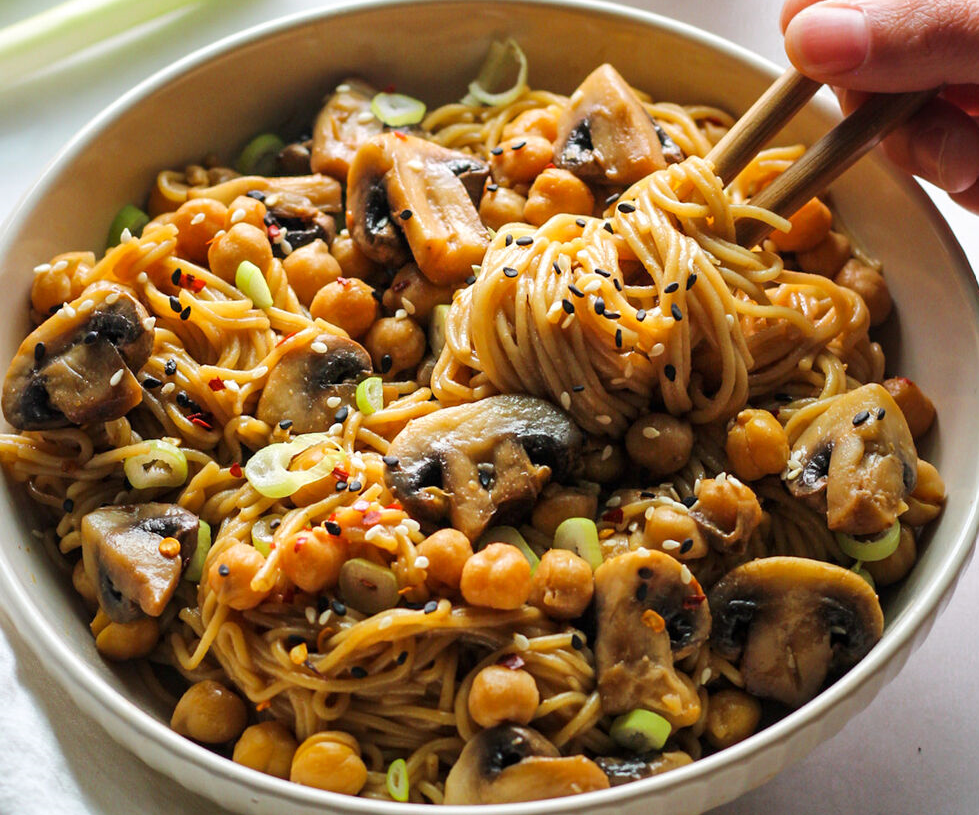Ingredients:
Sauce
- 3 Tbsp soy sauce or tamari (gluten-free)
- 1 Tbsp red miso paste
- 1 tsp sriracha
- 1 tsp garlic powder
- 2-3 Tbsp vegetable stock, substitute for water
MİSO SESAME NOODLES
- 1 tsp neutral oil or water
- 1 package (8 ounces) white mushroom, chopped
- 1 cup of chickpeas, drained and rinsed
- 8 ounces of angel hair noodles, cooked according to the back of the package. I used gluten-free millet angel hair pasta.
- 1/2 tsp toasted sesame oil, optional
GARNİSHES
- Black or white sesame seeds
- Crushed red pepper
- green onion, chopped
DİRECTİONS
- In a medium bowl combine all of the sauce ingredients together and whisk.
- Heat a large pan or wok over medium heat. Once hot, add the neutral oil and mushrooms. Saute for 3-5 minutes, or until the mushrooms let out their juices, stirring frequently.
- Add the chickpeas to the pan and cook for 2 minutes.
- Combine the cooked noodles and sauce and mix well. Cook for an additional 3 minutes, stirring.
- Take the pan off the heat, drizzle with sesame oil and divide it into bowls. Garnish with sesame seeds, crushed red peppers, and chopped green onions.
- Leftovers will last 2-3 days in the fridge. Garnish your noodles after you reheat them, not before.
Miso Sesame Noodles

Embark on a culinary journey that weaves together the umami richness of miso and the nutty allure of sesame with our Miso Sesame Noodles—a tantalizing fusion that beckons lovers of Asian cuisine and noodle enthusiasts alike. This dish is a celebration of complexity in simplicity, where a handful of key ingredients converge to create a symphony of flavors that dance on the taste buds. In a world where diverse culinary traditions converge, the Miso Sesame Noodles stand as a testament to the power of a few pantry staples transforming a humble noodle dish into a culinary masterpiece.
At the heart of this creation lies the unique marriage of miso and sesame—a pairing that elevates the noodles beyond the ordinary. Miso, with its fermented depth and salty umami, intertwines with the nutty richness of sesame, forming a harmonious flavor profile that takes center stage in this dish. This dynamic duo not only infuses the noodles with a savory complexity but also imparts a depth that transcends the sum of its parts.
The Miso Sesame Noodles are not just a meal; they are an experience—a tapestry of textures and tastes that unfold with each succulent bite. The silky smoothness of the noodles intertwines with the creamy miso, while the sesame adds a delightful crunch, creating a delightful contrast that keeps the palate engaged. As the flavors unfold, the dish reveals itself as a sensorial journey, inviting you to savor the nuanced interplay between salty, savory, and nutty notes.
This noodle creation is a testament to the beauty of simplicity. With minimal effort and a handful of high-quality ingredients, you can transport yourself to the streets of Tokyo or the bustling markets of Seoul. The Miso Sesame Noodles are more than a recipe—they are a gateway to exploring the nuanced world of Asian flavors from the comfort of your own kitchen.
In addition to its flavor profile, this dish offers a canvas for creativity. Customize the toppings with crisp vegetables, tofu, or protein of your choice to make it your own. The Miso Sesame Noodles are not just a dish; they are an invitation to culinary exploration, a starting point for those eager to experiment with the limitless possibilities that simple, quality ingredients offer.
As you twirl your fork around these delectable noodles, let the aroma of miso and sesame transport you to a realm where each bite is a celebration of Asian culinary heritage. Join us in savoring the brilliance of the Miso Sesame Noodles—a dish that marries tradition with innovation, simplicity with complexity, and an invitation to appreciate the beauty of a well-crafted noodle creation.
Gut Health:
Plant-based diets are often associated with improved gut health due to the high fiber content from fruits, vegetables, and whole grains. A healthy gut microbiome is linked to better digestion and overall well-being.
Anti-Inflammatory Properties:
Many plant-based foods have anti-inflammatory properties, which can help in reducing inflammation in the body. Chronic inflammation is associated with various health issues, and a vegan diet may contribute to its prevention.
Sports Performance:
Contrary to the misconception that vegan diets lack protein, many successful athletes follow plant-based diets to enhance their performance. Plant-based proteins can support muscle building and recovery.
Reduced Risk of Foodborne Illnesses:
Plant-based diets eliminate the risk of foodborne illnesses associated with the consumption of undercooked or contaminated animal products.
Economic Impact:
A vegan diet can be more economical as plant-based protein sources tend to be cost-effective compared to some animal products. It may be a budget-friendly option for individuals or families.
Mindful Eating:
Adopting a vegan lifestyle often promotes mindful eating. Being more conscious of food choices and sources can lead to a healthier relationship with food and a greater appreciation for the environmental impact of dietary decisions.
Preservation of Biodiversity:
The expansion of animal agriculture often leads to habitat destruction and loss of biodiversity. Choosing a vegan diet supports the preservation of ecosystems and the protection of various species.
Culinary Diversity:
Veganism introduces individuals to a diverse range of cuisines and ingredients from around the world. Exploring plant-based cooking can be a culinary adventure, embracing flavors and techniques from different cultures.
Reduced Antibiotic Resistance:
The use of antibiotics in animal farming contributes to the rise of antibiotic-resistant bacteria. Opting for a vegan diet can be a way to reduce the demand for such practices and promote responsible antibiotic use.
Cruelty-Free Beauty and Personal Care:
Veganism extends to beauty and personal care products. Choosing cruelty-free, vegan alternatives ensures that your lifestyle aligns with ethical choices beyond just dietary preferences.
